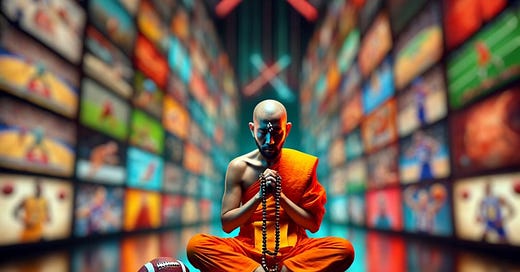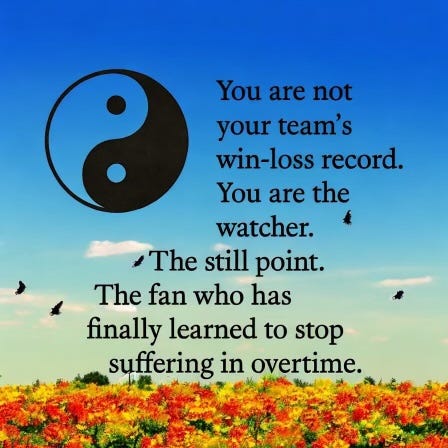Years ago, I once shouted at my television so loudly during an Ohio State football game that a neighbor knocked on my door to ask if everything was okay.
Well, everything wasn’t okay. The Buckeyes had just fumbled a punt, and I like millions of other emotionally hijacked sports fans was unraveling.
That’s the thing about having a sports obsession. It starts as a joyful allegiance to the team that defined your youth. It morphs into full-blown spiritual warfare in polyester jerseys. You yell. You pace. You swear off ever watching again—until the next game. And the cycle repeats.
A good friend recently texted me in agony: “Here’s a column from you that I desperately need: A Taoist approach to sports fandom… I get waaaaaaay too caught up in the urgencies of the playoffs… I need coping strategies!”
Brother, I feel you. I’ve been there. I am there. But with age, heartbreak, and some ancient Chinese philosophy, I’ve come to see the madness a little more clearly.
When Sports Stop Being Fun
Let’s start with the hard truth: fandom, for many of us, has stopped being fun. Somewhere along the way, our emotional well-being got lashed to the scoreboard.
What should be a release from daily stress becomes a source of it. We scream at athletes we’ve never met. We ghost dinner invitations because “it’s game seven.” We declare that we lost—as if Denver Nuggets superstar Nikola Jokić personally called us up and said, “Hey man, sorry I let you down.”
During my Buckeye-worshiping days, I’d start each Fall season bright-eyed and hopeful, only to descend into chest-tightening dread by midseason. Victory felt like relief, not joy. Loss felt like failure—my failure. This is certainly not what the Tao Te Ching would advise.
The Tao of Letting Go
The Tao reminds us: “When you are content to be simply yourself and don’t compare or compete, everybody will respect you.” But sports culture teaches the opposite—compare, compete, scream “WE WANT THE CUP!” until your voice gives out.
Wu Wei, the Taoist principle of effortless action, has become my emotional game-day strategy. It reminds me that there’s power in not forcing things, in flowing with the moment rather than raging against it. You’re not giving up on the team—you’re giving up on the illusion that your devotion controls outcomes. Spoiler: it doesn’t.
Watching the Colorado Avs or Denver Nuggets from a Taoist mindset means learning to ride the wave of momentum, not grip the sides of the couch until your fingers go numb. Root, cheer, then detach. They win, they lose. The river keeps flowing.
Bhagavad Gita for the Bleacher Creatures
Arjuna didn’t want to go to war. He was paralyzed by emotional attachment to the outcome. Sound familiar? Krishna’s advice? “You have the right to the action, but not to the fruits of the action.”
Translated for sports fans: You can watch the game, scream for your squad, but you don’t own the result. Let go of your emotional investment in the final score. The Nuggets will still play. You will still breathe. The cosmos will continue not giving a damn about three-point shooting percentages.
A More Evolved Masculinity
And here’s where healthy masculinity enters the conversation. We were raised to see emotional reactivity as passion. But true strength is in centeredness. If the outcome of a sporting event can ruin your entire weekend, it’s time to reevaluate where you’ve parked your power.
A man grounded in the Tao doesn’t shatter his remote over a missed free throw. He breathes. He laughs. He enjoys the absurdity of it all. He cheers with heart, not attachment. He remembers: the game is entertainment, not identity.
So the next time your team collapses in the third period, channel your inner Zhuangzi and ask yourself, “Am I a man dreaming he is a fan, or a fan dreaming he is a man?” Either way, skip the existential meltdown. Make popcorn. Crack a beer. And let the game flow like water.
You are not your team’s win-loss record. You are the watcher. The still point. The fan who has finally learned to stop suffering in overtime.
If the Daily Chocolate Taoist nomadic wisdom lights up your day, fuels your mind, or gives you a fresh perspective, I’d love your support as a paid member!
Or, if you’re feeling generous, drop a little (or a lot) of dirty chai latte love my way—every bit helps keep this Taoist journey flowing.
I’m committed to delivering high-quality, thought-provoking features straight to your inbox—no paywalls, no fluff, just raw, unfiltered wisdom on what it means to be human in today’s paradoxical, mysterious, and uncertain world.
Your support fuels my full-time mission, and I appreciate every single contribution. Let’s keep this energy going!
Diamond Michael Scott
aka The Chocolate Taoist







Miami Dolphin fans are Perpetually Disappointed, in large part because a group of men in similar uniforms managed not to lose a game for an entire season. Over 50 years ago.
If there were an app for FanTao as there is for FanDuel, the app would rake in millions, I think, from unbalanced fans (just as FanDuel does, come to think of it). Thanks!
As a former football fanatic, this was a reminder of all the wasted energy I spent bon something I had no control over. It also caught my attention that I don't have control of much of anything--and nothing that matters to anyone else. If I want to share anything with anyone, I can only put it out there. What it will mean to that person is not under my control. Should I care what he or she does with it? Well, that depends on whether I care about that person. I still have no control over that person. The only thing that I might be in control of is my reaction to how it is taken. Resignation? Acceptance? Disappointment? Decide to never share with that person again? Possible responses are endless. My preferable response would be to continue caring, but accept their response. Whether I am able to do that, I don't know. I can only determine to try, and to try to learn how.